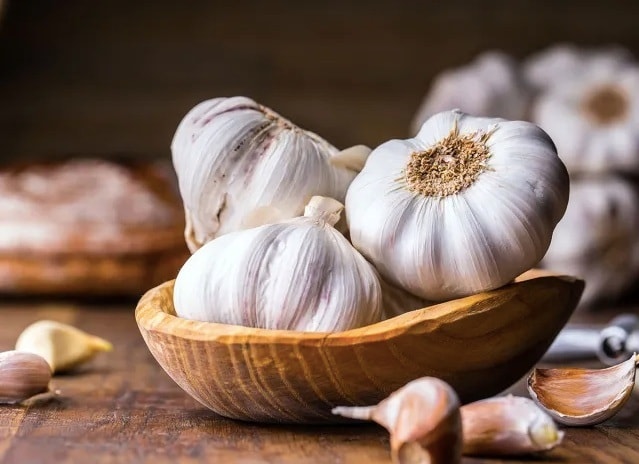Why should you not eat a lot of garlic for good health?
Eating 1-2 cloves of garlic per day may have health benefits, but eating more can cause bad breath, heartburn, stomach problems and other unpleasant side effects.
For many people, garlic is a favorite cooking spice, thanks to its pungent flavor and aroma. It works particularly well in stews, sauces, pizzas, and pasta dishes. It also offers a number of health benefits due to its medicinal properties. However, despite its versatility and health benefits, some garlic lovers wonder if it is possible to eat too much.
Side effects of garlic
According toHealthlineAlthough garlic is a healthy addition to a balanced diet, eating too much can cause some side effects.

It's best to eat garlic in moderation. Photo: Shutterstock
Increased risk of bleeding
One of the most serious side effects of eating too much garlic is an increased risk of bleeding, especially if you are taking blood thinners or have surgery. This is because garlic has anti-thrombotic properties, meaning it can prevent blood clots from forming.
Although bleeding from garlic is uncommon, one report details a case of increased bleeding after regularly eating 12 grams of garlic (about 4 cloves of garlic) per day before surgery.
One case of post-operative bruising. The cause may have been a dietary supplement the person was taking, containing fish oil and 10mg of garlic extract, both of which affect blood clotting.
Therefore, it is important to talk to your doctor before taking garlic supplements. If you are taking any medications or are about to have surgery, you should also consult your doctor before adding garlic to your diet.
Similarly, according to Master, Doctor Ha Hai Nam, K Hospital (Hanoi), garlic has the effect of thinning blood, preventing blood clots, inhibiting platelet aggregation, increasing the risk of bleeding and blood loss. Therefore, people who eat more than 12 grams of garlic per day (more than 4 cloves) will have a higher risk of bleeding during surgery.
Garlic breath
Garlic contains many sulfur compounds, which have many health benefits. However, these compounds can cause bad breath, especially when eaten in large quantities. This is especially true of raw garlic, as cooking reduces the amount of these beneficial sulfur compounds.
However, you can try some home remedies to get rid of garlic breath.
Digestive problems
Like onions, leeks, and asparagus, garlic is high in fructans, a type of carbohydrate made up of chains of fructose, a simple sugar. It can cause gas, bloating, and stomach pain in some people.
In fact, when people with fructan intolerance eat foods high in fructan, the food is not fully absorbed in the small intestine. Instead, the food passes to the large intestine untouched and ferments in your gut, a process that can cause digestive problems.
In addition, according to Dr. Nam, garlic contains a lot of fructose, which can cause bloating and stomach pain in people with fructose intolerance. The reason is that fructose is not digested in the small intestine but goes straight to the colon, where it ferments, causing bloating and other digestive problems.
People who already have underlying digestive diseases should be cautious when using garlic.
Heartburn
If you have gastroesophageal reflux disease (GERD), you may want to consider cutting back on your garlic intake. GERD is a common condition that occurs when stomach acid flows back up into the esophagus, causing symptoms like heartburn and nausea.
Garlic can reduce the tone of the lower esophageal sphincter. This is the muscle that helps prevent food from being pushed back into the esophagus when it contracts. When this muscle is weak, the upper end of the stomach does not close properly, leading to a reflux of food and acid into the esophagus, causing a burning sensation, heartburn, and nausea.
However, certain foods affect people with GERD differently. If you find that eating a lot of garlic doesn't cause symptoms, you probably don't need to limit your garlic intake.
How much garlic should you eat a day?
While there are no official recommendations for how much garlic you should eat, studies show that eating 1–2 cloves (3–6 grams) of garlic per day may provide health benefits. If you notice any side effects after eating more than this, consider reducing your garlic intake.
Cooking garlic before eating it can also help prevent side effects like garlic breath, digestive problems and acid reflux.
If you have any underlying health conditions or are taking medications, it's best to talk to your doctor before making any changes to your diet or taking any herbal supplements.
So, garlic is very nutritious and has many health benefits. However, if you eat too much, it can cause side effects such as bad breath, acid reflux, digestive problems and increased risk of bleeding. Therefore, it is best to enjoy this delicious spice in moderation and reduce your intake if you start to experience any side effects.


